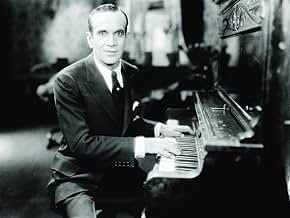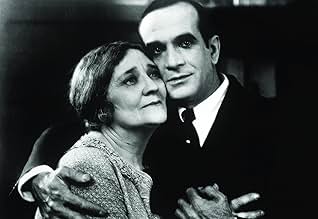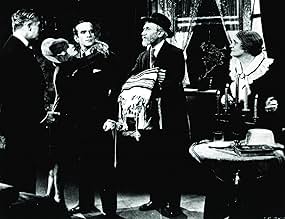O filho de um cantor judeu deve desafiar as tradições do seu pai religioso para poder realizar seu sonho de se tornar um cantor de jazz.O filho de um cantor judeu deve desafiar as tradições do seu pai religioso para poder realizar seu sonho de se tornar um cantor de jazz.O filho de um cantor judeu deve desafiar as tradições do seu pai religioso para poder realizar seu sonho de se tornar um cantor de jazz.
- Direção
- Roteiristas
- Artistas
- Indicado a 1 Oscar
- 3 vitórias e 1 indicação no total
- Jakie Rabinowitz - Age 13
- (as Bobby Gordon)
- Cantor Rosenblatt - Concert Recital
- (as Cantor Joseff Rosenblatt)
- Chorus Girl
- (não creditado)
- Chorus Girl
- (não creditado)
- Small Part
- (não creditado)
- Choreographer - 'April Follies'
- (não creditado)
- Small Part
- (não creditado)
- Violinist
- (não creditado)
- Small Part
- (não creditado)
- Buster Billings
- (não creditado)
- Dance Director
- (não creditado)
Avaliações em destaque
This is a powerful story with interesting characters and good songs, to boot. It was different to see Warner Oland as somebody else besides Charlie Chan. He played Jolson's father and I never would have recognized him had I not read the credits. Nor would I have recognized William Demarest.
Jolson, however, is the man who dominates the film. Some of this songs wound up being classics, ones played for years and years, such as "Toot, Toot Toosie" and "Mammy."
Faced with a very tough decision on what to do with his life, Jolson's character does the right thing in the end, which was nice to see. Overall, it's entertaining.
I have great difficulty in understanding the comments listed in the posts of how today's human rights standards can be applied to a film that was created 80 years ago.
We are talking about 1927,and it is hard for me to understand how today's negative comments are made about the Black-face and other racial comments. This was a convention of the time 80 years ago. I do not for a moment agree that the way minorities were treated was correct, but that was 1927, not now! You cannot erase history to make it fit today's standards.
I thought Al Jolson did a superb job in his singing,dialog,and acting in this film for the era. One would need to review and compare the singing and acting styles,that of other performers of the era and make comparisons. Crosby, Sinatra, Eddie Fisher, even Elvis Presley & Jackie Wilson said that Al Jolson was a great influence on their careers. To say he could not sing as in some posts here, is absurd.
If ever you want to get a real kick see this movie, if you can find a viewable copy, and revel in the historical significance of it. Also take out your copy, or pick up Singing In The Rain, which pays homage to the advent of talking pictures. Although they goof with the characters, such as the voice of Lina Lamont, the very real challenges of transitioning from a silent world to a talkie world is very evident.
Você sabia?
- CuriosidadesThis is the first feature-length movie with audible dialogue.
- Erros de gravaçãoMary recieves a telegram dated August 8, 1927. Later in the film, Jack is seen writing a letter to Mary, dating it August 7, 1927.
- Citações
[opening lines, first quote and first words in the first widely-seen talking picture]
Jack Robin: Wait a minute, wait a minute, you ain't heard nothin' yet! Wait a minute, I tell ya! You ain't heard nothin'! You wanna hear "Toot, Toot, Tootsie"? All right, hold on, hold on...
[then he walks back to one of the band members]
Jack Robin: Lou, listen. Play "Toot, Toot, Tootsie", three chorus, you understand. In the third chorus, I whistle. Now give it to 'em hard and heavy, go right ahead.
- ConexõesEdited into Okay for Sound (1946)
- Trilhas sonorasMy Gal Sal
(1905) (uncredited)
Written by Paul Dresser
Sung by Robert Gordon (dubbed by an unidentified singer)
Principais escolhas
Detalhes
Bilheteria
- Orçamento
- US$ 422.000 (estimativa)
- Tempo de duração1 hora 28 minutos
- Cor
- Proporção
- 1.33 : 1
Contribua para esta página































